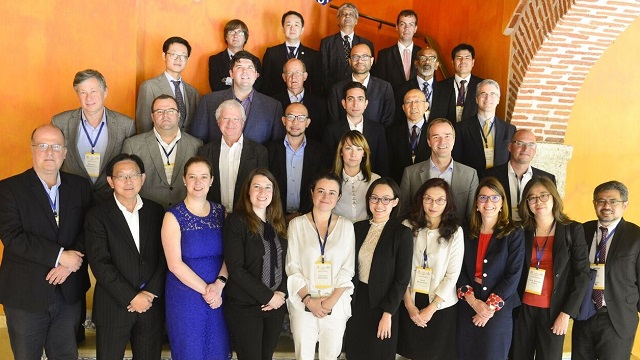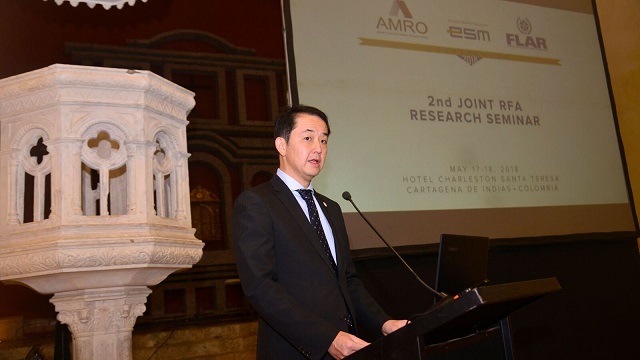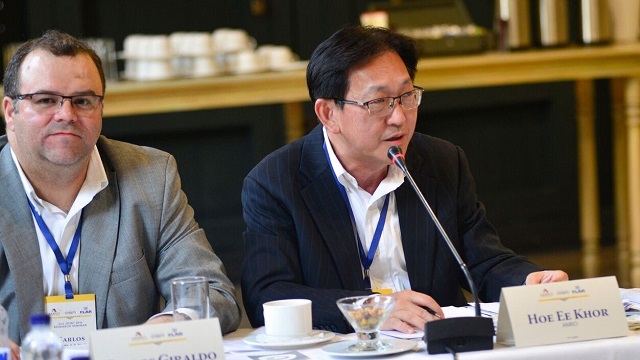Cartagena de Indias, Colombia, May 18, 2018 – Regional Financing Arrangements (RFAs) need to work closely together to fully deploy their individual capabilities and strengthen synergies. Such close cooperation between RFAs and the other layers of the Global Financial Safety Net (GFSN) is crucial to strengthening global financial and economic stability. These were the main conclusions of participants at the 2nd Joint Regional Financing Arrangements Research Seminar, held today in Cartagena de Indias, Colombia.

Speakers and participants at the 2nd RFA Research Seminar in Colombia.
The RFAs Research Seminar is an annual event that brings together scholars and institutions to discuss global and regional financial stability. It is jointly organized by ASEAN+3 Macroeconomic Research Office (AMRO), the European Stability Mechanism (ESM), and the Latin American Reserve Fund (FLAR). “I welcome this cooperative event, which brings RFAs of the world, the International Monetary Fund (IMF), and academics together. Sharing know-how and aligning practices is crucial for the increasingly important work these institutions do to fight crises”, said Rolf Strauch, Chief Economist at the ESM.
During the 2nd Joint RFA Research Seminar, topics discussed included strengthening collaboration among the multiple layers of the GFSN, designing conditionality and country ownership, and promoting regional economic integration and the role of RFAs.
One point of discussion was how to combine different GFSN tools to generate synergies during financial and economic shocks. These different layers can better align practices and complement each other. “Complementing the different layers of the GFSN is a key factor to strengthen its capacity to prevent and solve economic and financial crises. Ongoing collaboration among RFAs and between RFAs and the IMF is a key element for regional and global economic stability”, said José Darío Uribe, FLAR Executive President.
Based on the experiences of countries in Asia, Europe and Latin America, participants discussed issues such as the type of assistance packages and the design of programme conditions. Experience shows that designing and applying a conditionality framework to achieve a country’s macroeconomic and financial stability is a complex matter. On the one hand, it contributes towards ensuring that the country receiving the financing implements the necessary policy reforms to achieve macroeconomic stability, reduce moral hazard, and strengthen the repayment capacity. On the other hand, conditionality should be designed in a way to ensure national ownership and that its implementation will not cause unnecessary social costs.

Mr Yasuto Watanabe, Deputy Director of AMRO speaks at the seminar.
“Smooth design and implementation of conditionality depend very much on the specificities of the beneficiary countries, and country ownership is crucial to ensure the relevancy and adaptability of the conditionality in the domestic policy and legal context”, said Yasuto Watanabe, Deputy Director of AMRO. “The seminar is very useful in facilitating knowledge exchange and allowing us to acquire lessons learned from past experiences that are relevant to financial institutions, particularly RFAs”.
A final topic for discussion was the role of RFAs in promoting regional economic integration. In this regard, RFAs have a key role to play. The more localised knowledge of the countries’ economic situation, as well as closer their ties with the countries they operate in, provide a privileged position for RFAs to promote financial stability and integration among the regions’ countries.

AMRO Chief Economist Dr Hoe Ee Khor moderates one session of the seminar.
As Dr. Uribe said, “the regional economic integration processes should have mechanisms that may contribute to guarantee the macroeconomic stability of the member countries, a matter where RFAs have a fundamental mission as part of the GFSN, in coordination with global and national bodies and institutions”.
The 3rd RFA High-Level Dialogue will take place in October in Bali, Indonesia, and it will focus on cooperation, including mechanisms and complementarity between RFAs and the IMF.
